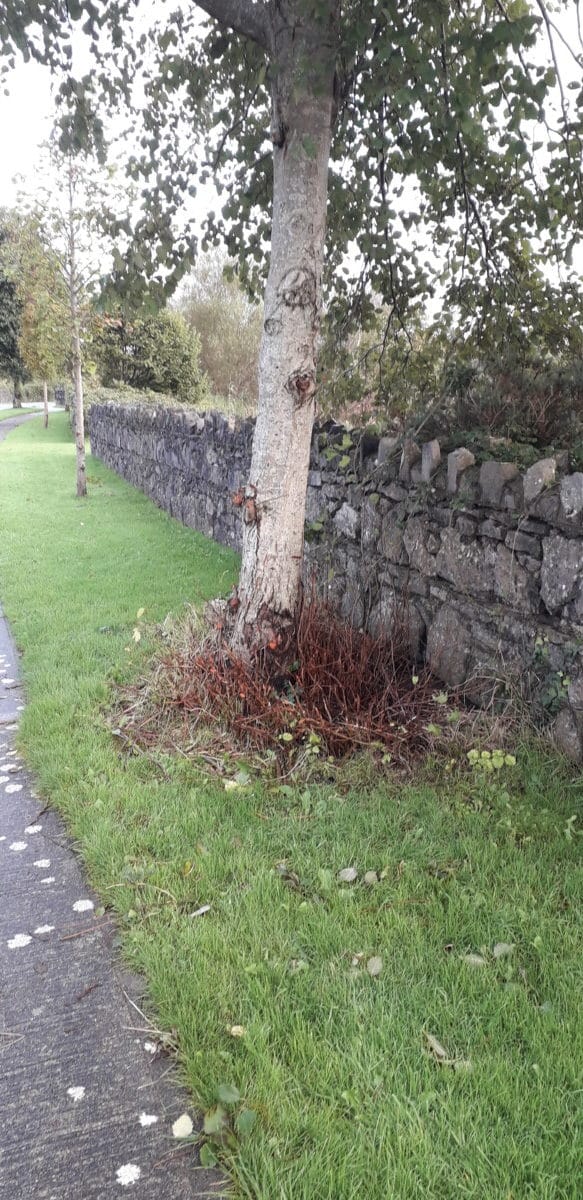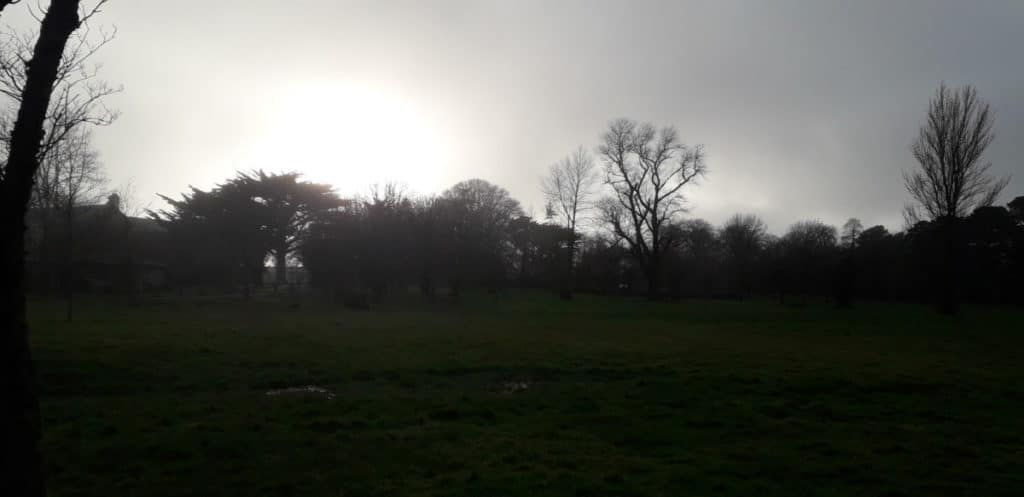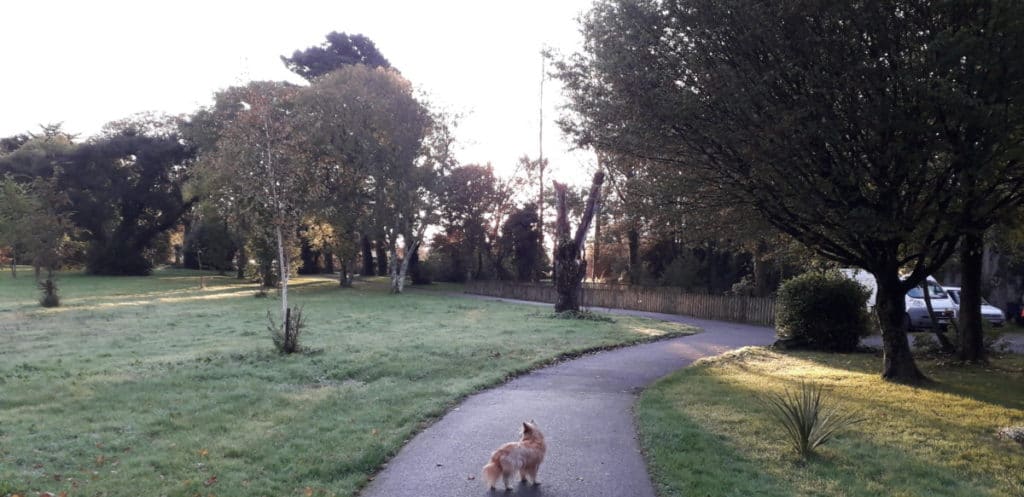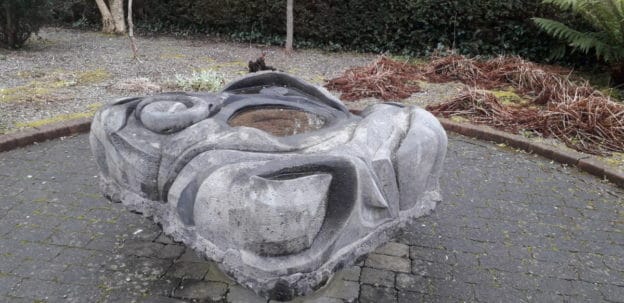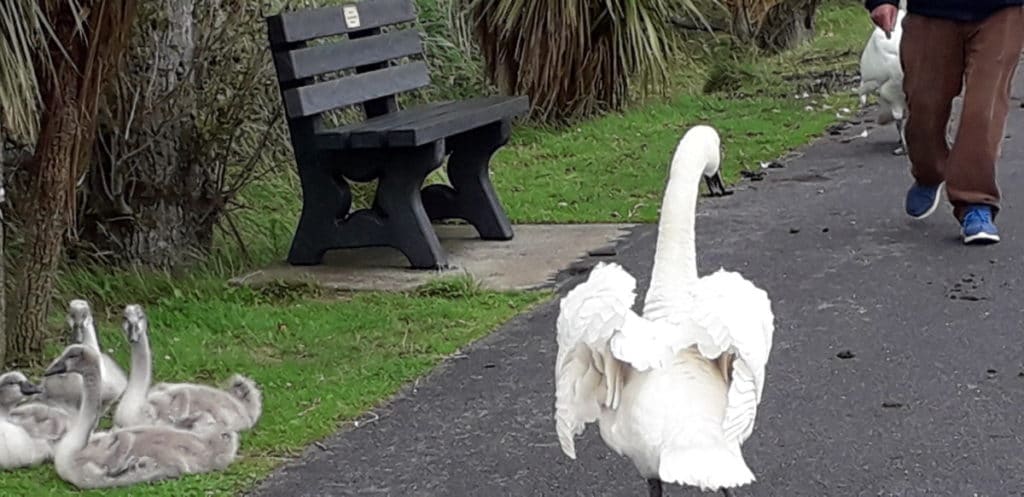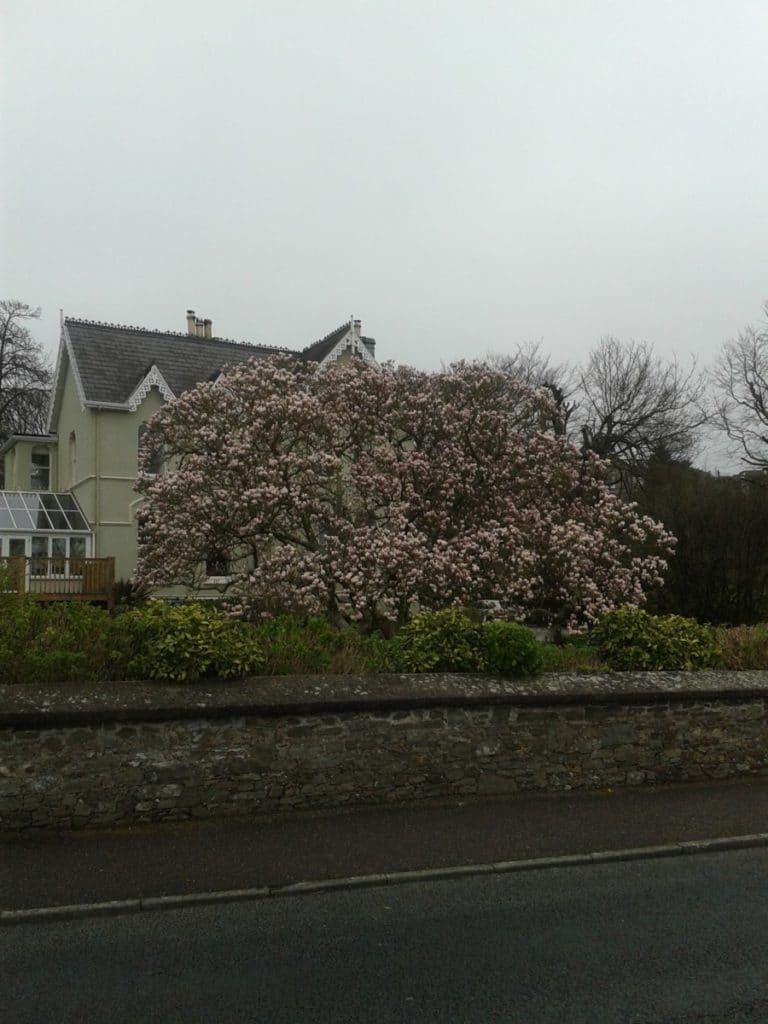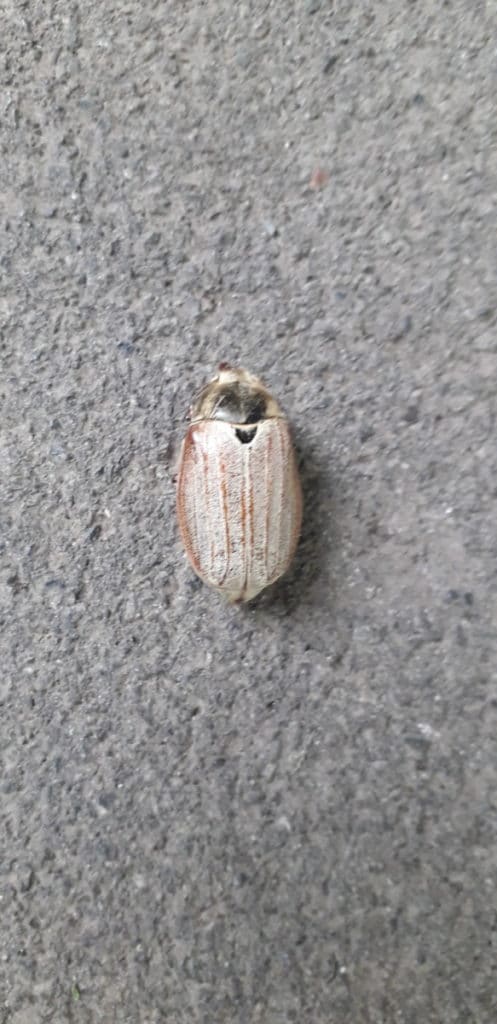Driving out from Springwell Gardens you have to stop at the junction with the road to town. Cars come down the hill to your left, from the Wetlands across the road and from town to your right. The traffic from the Wetlands slows and stops, but cars from the left and right have the right of way. You get quite a few speedsters heading home from the shops, school runs, and a day at the office on the town side. All fine and part of anyone’s life in an Irish town. The problem lies with a hornbeam growing on the verge to the right just where the footpath curves into Springwell Gardens. It’s not the tree, I like hornbeams, but the low-lying branches that bunch at the base of the trunk. The full-leaf branches are like a curtain, blocking the view, especially when sitting in a low-set car. I’ve nearly become a cropper a few times, only seeing a car as it passes the tree and needing to reverse quickly from trying to peer around the leafy trunk.
The line of trees along the road from town is taking a mature shape, and the council trims every one except this hornbeam. Why they stop at the last hornbeam, I’m not sure. Maybe they think it belongs to the private estate, or is the growth now so thick that they think it looks better that way? It doesn’t bother me in the autumn and winter when the leaves fall but come spring and summer, the green curtain is pulled again. Like so many things in life, I only think about the growth when I can’t see around it, and my ‘I must do something about that tree’ is quickly forgotten once I’m out on the open road. If I had the tools, I’d cut the branches and be done with the problem, but happily, I don’t have a garden shed for mowers and clippers or anything bigger than a trowel. I see the council maintenance crews around, but I’m always a bit uncomfortable asking people to do things for me, which is probably one of the many reasons I would have made a poor army officer.
During early September, I was walking home with Daisy from our early morning circuit around Tralee Town Park. Coming up to where the hornbeam grew, I saw a councilman on his mower trimming the grass. A grey-haired man was standing by one of the small trucks they drive these days, pulling on his heavy weather, high-viz work clothes and leaning onto the back for support. I walked up and said hello, and he turned with a big smile and said something about the weather, which I answered.
“Would you be able to cut back the low branches on that tree?” I asked after a couple of minutes of chat.
“Which one?”
“That one there,” I said, pointing to the only tree near us, “it’s just the branches are so low they block the view of cars coming from town. If I had the tools, I’d do it myself.”
The man looked concerned and walked up along the footpath.
“Oh, I see what you mean,” he said as we got near the hornbeam, “I wonder why we didn’t do it before?”
The man went on to tell me he reckoned he’d planted nearly every tree along the road, not long after starting with the council and now, as he was coming up for retirement, the trees were thriving. There was no tree planting ceremony in those days, just himself and a couple of other men with an auger for digging holes and a truck full of saplings. They would mark out where each one would go, dig the hole and drop in the tree.
“I must have planted half the young trees in town during my time,” he said, “I suppose it gets that way when you’ve been around long enough. I can’t see any of the young fellows today doing the same time as me if even the council would take on anyone.”
We chatted more about this and that until the man on the mower came down to empty the cuttings. I was told that this was the man allowed to operate cutting equipment, and we’d have to get him to do the work. He got off the mower and, after a brief inspection of the hornbeam, said he would take care of the branches. The problem was he didn’t have a saw with him and would have to ‘raise a ticket’ back at the depot to take one out for a job.
“There’s no hurry,” I said, “thank you for taking care of it.”
I went off, and later on in the morning, I was in my bedroom when I heard a small chainsaw in action up the road. I looked out to see the second man from earlier going around the tree and was delighted that they had come back so quickly. Council employees get a lot of stick and are the easy, go-to stereotypes of men looking into a hole leaning on a shovel, but in my experience, the maintenance people are hard-working and have a lot of pride in their jobs. I was a bit surprised, though, to see the tree was only partially trimmed when heading out to collect Fred after lunch. The next morning when coming back from my walk, I saw the whole job was a bit of a mess.
Two days later, on Friday morning, I’m walking through the park around eight in the morning. Coming in past the Rose Garden, a man in high viz, all-weather, workwear comes through the hedges to my left, carrying a rubbish picker and a refuse bag.
“We’ll get down to fix that later,” he shouts over at me.
I stop and see it is the older of the two men, and I head over to meet him.
“Paddy went back down later with the saw from the yard,” he says, walking towards me, “but it broke down as he was cutting.”
“I saw it wasn’t finished all right,” I said smiling, “thank you for getting down so quickly.”
“He went back up and got another one, but it wouldn’t start for him when he got to your tree. We’ll get back today, I’d say.”
The hornbeam is now my tree and is creating a bit of an issue for the two men. I’m touched they took the time and saw it as a mission to get the work done.
“Well, I can see up the road now anyway”, I say, “thank you.”
We chatted about the weather and how he was due for retirement in April but stayed on for the summer as the weather was good and he liked working outdoors.
“When a fellow gets to my age, there is no heavy work, and I like doing the tidying up around the place,” he explained, “they have nobody coming up, so I might go on a three-day week for a few years.”
The man explained how he had a small farm at home, and it kept him busy but not enough that he couldn’t do three days a week in town. He spoke with pride of his home townland and the work of the locals in keeping it alive.
“It gets dark in the winter, though, and the job here keeps me going,” he said, the unspoken words of dealing with dark days being understood.
“The winter can be long,” I agreed.
“I had a man take a third cut from the fields last night,” he went on, and I remarked how a third cut of silage was good, “you know the man cutting the fields was 81 the day before? Sitting up on the tractor and he did all the work himself, didn’t want me at all.”
We said our goodbyes, and I headed home. For the next couple of weeks, my tree went untrimmed. Whenever I saw the man around town, he’d wave, and we’d stop for a chat. I never brought up the hornbeam as I didn’t want to sound pushy, and anyway, I could see up the road now. Yesterday though, I was coming back from my walk, I came across the two – it was now a two-man job – trimming and tidying up around the tree.
“Is that ok now?” the man with the mini-chainsaw asked as I approached.
“Great, thank you very much.”
“We thought we’d better get down before the weather changes, and while they had a working saw in the yard,” my friend in the high-viz yellow workwear says, “it was looking very untidy.”
“Is it one of yours?” I asked.
“They probably all are,” he said, looking around, the unspoken pride in his eyes, happy to be viewing a life’s work.
Today the tree is trim, and I can see up the road. Every time I drive out from now on, I’ll look at the tree and think of my friend, planting trees as a young man, tending them as he retires and still with pride in his work.
What more could a man ask for after a lifetime of service?
